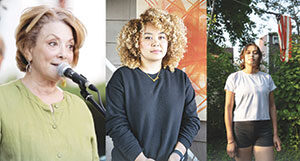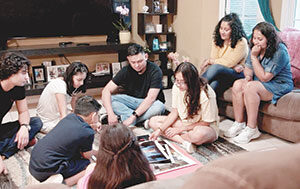
The short film “We Are Here Too,” which explores the experiences of four women during the Covid pandemic, was recently screened at the Somerville Museum.
By Emilia Wisniewski
The Somerville Museum hosted an online showing of the city-based short film We Are Here Too on November 22, capturing the stories of four creative and talented women and their experiences through the global pandemic.
The film, produced by Keidrick Roy, Lili Bayarmagnai, and Julia Reihs and supported by the Somerville Arts Council, initially premiered on June 16 at the Somerville Community Growing Center. The Museum hosted another showing that followed with a question-and-answer session from the subjects of the film.
Iaritza Menjivar, Sneha Shrestha (also known as Imagine), Tori Weston, and Raynel Shephard have individual, artistic talents that were somewhat lost when the pandemic started. The 23-minute short film told the unique stories of their hardships and how their artistry helped them through it.
The film gets very personal with its subjects, showing shots of old family pictures, them in their work environments, and generally how they live their lives in Somerville. There are also overhead shots of Somerville that help tie in the community aspect that is very central to the film’s purpose.
 Menjivar is a photographer that started taking pictures in college, with her main subjects being immigrants, people of color, and, most importantly, her family. She said her photos are “all about people” and the social distancing protocols made it hard to continue her passion when the pandemic arrived.
Menjivar is a photographer that started taking pictures in college, with her main subjects being immigrants, people of color, and, most importantly, her family. She said her photos are “all about people” and the social distancing protocols made it hard to continue her passion when the pandemic arrived.
Her family struggled through the pandemic but, through donations from her photography services in the Somerville community, she was able to help them and other first-generation families who were left jobless.
“I think one thing that we all learned is that we’re in this fight together,” Menjivar said in the film. “We are not separated and that we have to be there to support each other.”
Imagine paints murals, her art heavily reflective of her identity as a woman from Nepal. Living in Somerville for a number of years, she meshes her two different worlds in her art. Imagine takes inspiration from graffiti art to create large-scale projects on buildings and walls around Massachusetts.
Imagine raised funds for the #StopAsianHate movements, selling prints of the Nepali alphabet that sold out within 24 hours. She said she believes that by being successful in her business and inspiring people of Asian descent through her artwork, she is defying the system that has long prejudiced against her and others like her.
Weston is a non-fiction writer and lithographer, her work being reflective of her as a black woman. She gained an interest in hearing other peoples’ stories when listening to her relatives retell their experiences in the Jim Crow era.
Writing helped Weston “remain in touch” with her feelings, especially with the murders of George Floyd and Breonna Taylor creating a national uproar to call out racial injustice. She said she wants her pieces to start a conversation, from feminism to race, and to be viewed by people from different places.
“The pandemic was time where I could sit in my feelings in a way I never had before,” Weston said. “I had to write it down, I had to sketch it, I have to show the rest of the world what we go through.”
Shephard loves to sing and thought of it as a way to carry on her mother’s legacy, as she was a classically-trained singer. But, with the pandemic and a cancer diagnosis, she found it difficult to continue and asked herself “what do I have to sing about?”
Now, she compares her being able to sing as the spring of her life. She mostly sings songs produced or written by women.
After the film, the host and audience asked the women questions about the filming process and their careers now. One question asked was why they said yes to being in the film. Imagine said she was hesitant at first.
“When somebody wanted to dig deeper into my life at that time, my reaction was ‘no,’” Imagine said. “After building that trust (with the documentary team), I was confident that my story will be told in a way that is authentic to me.”
Another question posed to the women was what they thought the audience should take away from the documentary. Shephard said that she feels very hopeful about her future, even though she felt the opposite just a couple of years ago.
“People will always need to express themselves through one creative outlet or another,” she said. “And it’s never too late to do that.”
The short film can be viewed publicly on Vimeo: https://vimeo.com/juliareihs.

 https://www.portersquarebooks.com/
https://www.portersquarebooks.com/













Reader Comments